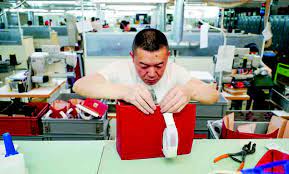Chinese migrants make a future in Italy

Rome: Made in Italy — these are more than just three words on a manufacturing label. They have come to be an adage for quality. What makes ‘Made in Italy’ so special that consumers are willing to pay a premium price?
Cologna, from the University of Insubria, said it is the combination of beauty, a rich historical heritage, and a certain form of elegance tied to a job well done by a fine Italian hand.
“But now, of course, we also have a fine Chinese hand working at it,” he added.
Italians take the ‘Made in Italy’ label seriously. So seriously they even passed a law in 2009 saying companies can claim a ‘Made in Italy’ tag only if products are designed, planned, processed, and packaged on Italian territory. But the law did not put any restrictions on the workers who make the products. Workers do not have to be Italian, or even European.
For more than two decades, Chinese fast fashion factories in Prato have been operating, initially to cater to the lower end of the Italian fashion market and provide affordable clothing to the masses across Europe. However, some Chinese factories are now breaking into the high-end market, manufacturing for the houses of Gucci, Armani, and Prada.
Fu Fanghui, a first-generation Chinese migrant, has made a name for himself as a producer of bags for prestigious Italian high-fashion brands. He emphasized the utmost importance of embracing a mindset that places the brand’s quality above any short-term gains.
“You must prioritize quality as if it were your own life,” he said. “Once you possess such a spirit, there is nothing you cannot achieve. Over time, these esteemed fashion houses have become increasingly convinced that we Chinese possess this remarkable spirit. It is not only our dedication to product quality that impresses them, but also our ability to seamlessly integrate their culture and concepts. This is particularly evident among the Chinese people, particularly those hailing from Zhejiang province, who readily assimilate these values with great enthusiasm.”
According to Fu, six out of 10 factories in Florence producing products for big Italian high-fashion brands are owned by Chinese entrepreneurs.
The Chinese in Italy are not solely engaging in fast fashion or manufacturing for Italian brands. In fact, some individuals have managed to break the glass ceiling and ascended to the upper echelons of Italian design.
Xu Yuejuan represents a striking departure from the prevalent perception of native Chinese involvement in the Italian fashion industry, which often revolves around fast fashion, assembly-line production, long work hours, and cheap labor.
Xu has become the first native Chinese member of the esteemed Milan Fashion Club. Her fashion label, Delves-JK, is now mentioned in the same breath as industry icons including Louis Vuitton, Armani, and Christian Dior.
However, Xu’s journey to the top tier of Italian design was not without its challenges, as she encountered bias along the way.
“When people see me, they often remark, ‘You are not Italian’, as if assuming that European designers are inherently superior,” she revealed.
“There was a prevailing bias within the fashion industry that Chinese designers were only capable of imitation and copying. The perception was that our strengths lay primarily in replicating the work of others.”
Xu emphasized the significance of originality in gaining recognition from European counterparts, saying: “When you create something unique and authentic, Europeans will undoubtedly acknowledge it. The key lies in your originality.”
Xu also believes prioritizing quality is paramount.
“It is through maintaining impeccable quality within your brand that your reputation can endure and thrive over time,” she said.





